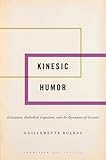Kinesic Humor: literature, embodied cognition, and the dynamics of gesture / Guillemette Bolens.
Series: Cognition and poetics seriesPublisher: New York, NY : Oxford University Press, [2021]Description: 208 pages ; 23 cmContent type:- text
- unmediated
- volume
- 9780190930066
| Item type | Current library | Status | Barcode | |
|---|---|---|---|---|
 Open Access Books - Publishers
Open Access Books - Publishers
|
National Law School | Available | OABP308 |
Includes bibliographical references (pages 171-202) and index.
"Literature is one of the richest sources of information concerning the ways in which human beings are able to play with cognition. According to the theory of embodied cognition, human cognition is grounded in the ability to feel, perceive, and move (called sensorimotricity). The pervading cognitive process called perceptual simulation, which is activated when we cognitively process a gesture in a real-life situation, is also recruited when we read about actions, movements, and gestures in texts. Kinesic Humor examines literary works written by major authors-including Chrétien de Troyes, Cervantes, Milton, Saint-Simon, Rousseau, Sterne, and Stendhal-in which perceptual simulations of complex sensorimotor events and kinesic interactions trigger humorous effects. Such works create anticipations regarding movements and sensations, which are unexpectedly thwarted, thus producing cognitive shifts typical of humor. By bringing together literary studies, cognitive studies, gesture studies, and humor studies, this book offers original perspectives on such important artworks as Paradise Lost, Don Quixote, and Le Rouge et le Noir. In it, the importance of rhythm and tonicity in the perception of movements and gestures is a focus of attention. The interactional significance of gestures often lies in their dynamics, and this fact also applies to the cognitive retrieval of narrated gestures during the act of reading. The method of kinesic analysis practiced in this book takes into account such cognitive features in correlation with the historical and cultural contexts in which the literary works were written"-- Provided by publisher.
There are no comments on this title.
